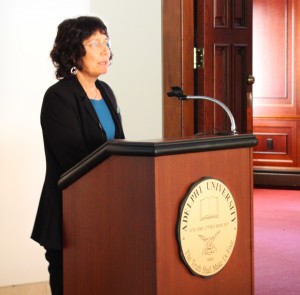Hadas Wiseman, Ph.D., addressed this topic at a Derner Institute colloquium, held in honor of Holocaust Remembrance Day.
 January 28, 2015 — In honor of Holocaust Memorial Day, Adelphi University’s Gordon F. Derner Institute of Advanced Psychological Studies hosted “Intergenerational Echoes of the Holocaust in Second and Third Generations,” a free colloquium by Hadas Wiseman, Ph.D., a professor in the Department of Counseling and Human Development at the University of Haifa.
January 28, 2015 — In honor of Holocaust Memorial Day, Adelphi University’s Gordon F. Derner Institute of Advanced Psychological Studies hosted “Intergenerational Echoes of the Holocaust in Second and Third Generations,” a free colloquium by Hadas Wiseman, Ph.D., a professor in the Department of Counseling and Human Development at the University of Haifa.
Dr. Wiseman discussed her research, conducted with Derner Institute Dean Jacques P. Barber, Ph.D, on the central relationship themes and communication patterns of adult children of Holocaust survivors. Using the Interpersonal Theory of Interpersonal Problems (IIP) and the Core Conflictual Relationship Theme (CCRT) methods to analyze narratives of Holocaust survivors’ offspring, Dr. Wiseman and Dr. Barber found Holocaust traumas to have long-reaching interpersonal impacts for survivors as well as their children and grandchildren.
Specifically, second-generation Holocaust survivors described an experience of both “knowing” and “not knowing” about their parents’ traumatic experiences. Children of survivors have a nonverbal awareness of their parents’ traumas without an experience of verbal communication about the facts. This “knowing and not-knowing” about trauma seems to leave the second generation with a sense of unfinished business that impacts their adult interpersonal relationships. In establishing relationships with their own children, the children of survivors often aspire to correct the parent-child relationship they experienced by maintaining close family ties and by working toward open communication.
Dr. Wiseman’s and Dr. Barber’s findings about intergenerational transmission of Holocaust trauma are presented in full in their recent book, Echoes of the Trauma: Relationship Themes and Emotions in Children of Holocaust Survivors (New York: Cambridge University Press, 2008).
Dr. Wiseman also presented her findings about the impact of Holocaust written memoirs on the memoir authors, their children and grandchildren. By analyzing interviews with memoir authors as well as family interviews, Dr. Wiseman and colleagues found the memoirs tended to bridge the silence between the generations and to strengthen connections to the survivor.
Dr. Wiseman suggests that such multigenerational impact on relational patterns is likely common to all massive traumas.
For further information, please contact:
Todd Wilson
Strategic Communications Director
p – 516.237.8634
e – twilson@adelphi.edu